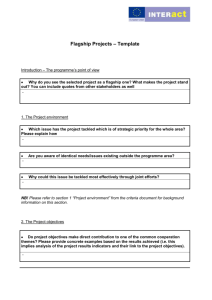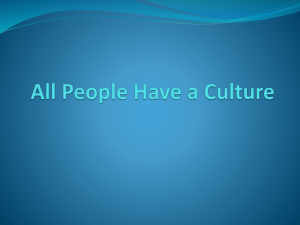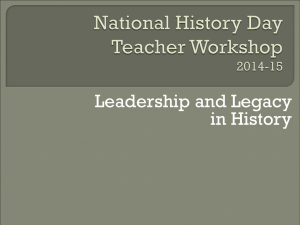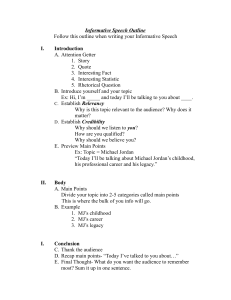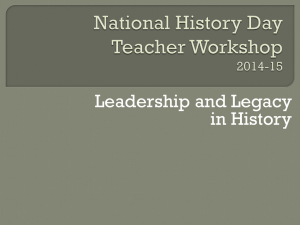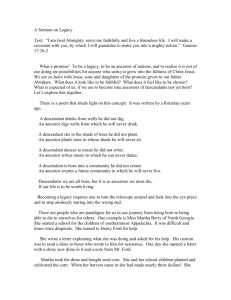Thesis PowerPoint Presentation.
advertisement
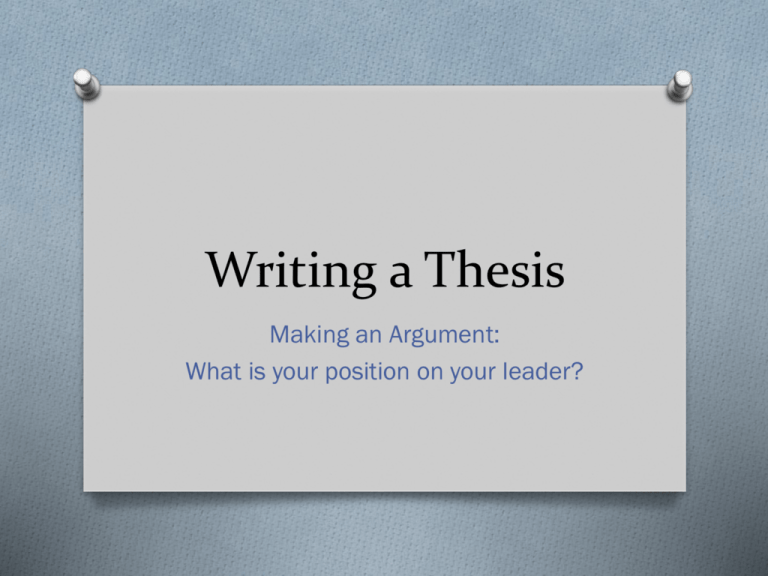
Writing a Thesis Making an Argument: What is your position on your leader? An NHD Thesis One sentence that presents an argument about the topic. Addresses a narrow topic. Explains what the researcher believes to be the historical significance. Connects the topic to the NHD theme. The body of the paper or the website > > The script of the performance or documentary > > The headings and captions in an exhibit > > Henry Ford created the assembly line. Henry Ford made cars more affordable with the production of the Model T. Henry Ford’s vision as an industrial leader led to the development of the assembly line in the early 1900s. Ford’s legacy as an industrialist reshaped American culture by creating an automobile that was affordable for the average American worker. Think about …. How do you define leadership? What does it take to be a great leader? Besides being a leader who has followers, there also needs to be a goal, motivation, a plan, action(s) taken, persistence to achieve, …Just being a cool person will not keep people willing to follow you for long… What are the qualities that it takes to be a leader? Brainstorm a list of words. Which 3 are most important? UNPACKING LEADERSHIP AND LEGACY Any leader should articulate a vision, have a plan for where society is and where they want it to go. What is your leader’s vision? Does leader motivate others and how? Does your leader make effective decisions. Is your leader willing to confront difficult or challenging issues and face them head on? How did person impact history? Thesis = Topic + Theme + Impact. 3 Parts: ☛Topic ☛theme words are interwoven ☛Impact ☛ How did your person change an individual, community, country, world? ☛ What was/is the historical impact? ☛ Did it have a societal, economic, political, technological, or other change? The 5 W’s WHO deals with who is being affected or involved in the situation you are researching. Think of it like the characters in a story. WHAT is associated with the event you are researching, or what the “who” is involved in. This is a very broad term that can pertain to almost anything you are studying. Are you looking at a war, treaty, movement in history? WHERE Specific locations are going to be your main target here, looking exactly where the event you are researching took place. Within your project you may want to include information on why this event took place in this particular location. WHEN In this case, you are looking for a specific location in time instead of space. Include a time frame if at all possible, such as, “The American Civil War took place from 1861 to 1865.” WHY This is the most important element! Why is going to look at a couple of different things, but most importantly why did an event happen and why was it important. Basically, you are going to want to look at this through a lens of cause and effect; what caused it and what were the after effects. Remember to pull in the theme: LEADERSHIP AND LEGACY! Don’ts! Don’t include the kitchen sink! No I, we, they, us Leave out the facts - leave those for the project - put the argument in “changed history forever” or “…the most important date of all mankind” An argument takes a stand on an issue. It seeks to persuade an audience of a point of view. Night at the Museum is a movie that portrays the historical events. Night at the Museum is inaccurate in its portrayal of historical events. Description Argument Non-Examples O Frederick Douglass made a speech in which he wondered why slaves should celebrate the Fourth of July. O Statement of fact. Nothing to argue. Non-Examples O Frederick Douglass’ speech, What to the Slave is the Fourth of July, is the most effective speech ever. O Offers only the writer’s opinion. There is no criteria for why the speech is effective. Don’t: Jackie Robinson was a really important black baseball player. Do: Jackie Robinson played baseball at a time when teams were segregated, black from white. With the assistance of team manager Branch Rickey, Robinson took action, desegregating Major League Baseball as the first black ball player with the Brooklyn Dodgers. He left a legacy opening professional sports to African American athletes. Don’t: I think Susan B. Anthony did good things. Do: Susan B. Anthony fought for women’s right to vote. Through social action and her writings, Anthony inspired thousands of women and men to fight for suffrage, which eventually resulted in the 19th amendment. Think about …. How do you define legacy? What does it take to leave a legacy behind? Questions to consider … Why is this person important—explain the historical significance. Give three clear reasons why this was important to history at a local, state, national, and/or international level SOOOOOOO, What happened? Historic Impact: How did/does their legacy ripple out into the bigger parts of history? Sentence Frame At a time when _____ _______________________________ (status quo, circumstance), _______________________________________________ (Topic), showed leadership by__________________________________________________. The immediate impact was ______________________________________________________, The long-term consequences, or legacy , included _________________________________________. At a time when blacks in Mississippi were not allowed to vote, and Freedom Summer set the stage for revolutionary changes, Fannie Lou Hamer showed leadership by helping to found the Mississippi Freedom Democratic Party in 1964 and giving a memorably passionate speech at the convention. Although there were early failures and it was an arduous journey, Hamer’s leadership helped result in the Civil Rights Act of 1965. Hamer’s leadership resulted in a legacy of voting and political empowerment for black Mississippians. Wait!! I’m still confused. Could you try explaining it another way? You are not just introducing your topic. You are creating an argument that expresses your topic’s significance and demonstrates how the theme plays a central part. What are you trying to prove? 30 Second Pitch You have 30 seconds to explain the historical significance of your leader. GO!
